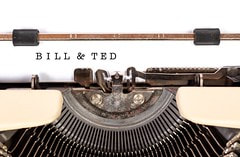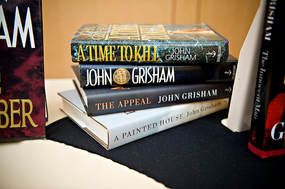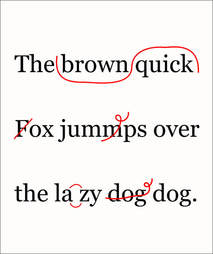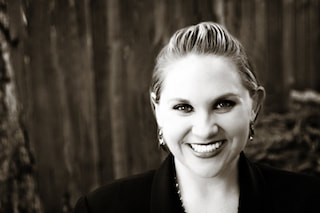 // Creative Commons photo by Jim Makos. // // Creative Commons photo by Jim Makos. // I remember when I first read The Hunger Games, I liked almost everything: the action, the dystopian world-building, the character development. What I didn’t enjoy was the use of first person, present tense point of view. It seemed silly to me. Well, guess what? Several years later, I find myself employing the same POV as Suzanne Collins, and many YA authors who followed her, for my suspense novel. I suppose that makes me the silly one. Actually, I realized that the immediacy that both the writer and the reader feel when “I” am telling the story is powerful. You are able to get inside the head of the protagonist and follow him or her on a compelling journey in which all other distractions are cast by the wayside. When I wrote Fool’s Luck, I would sit for hours on end, banging away on the keyboard as I tried to capture the words flooding out of my head. I lost track of time and external reality as the story itself became the world I was living in. I only hope by using the first person (and the present tense in the first and last chapters) that readers will get as lost in the story as I did.
0 Comments
 Creative Commons image courtesy of Trending Topics 2019. Creative Commons image courtesy of Trending Topics 2019. Living in the suburbs of Los Angeles, everywhere you go seems to be the back drop for one movie/TV show or another and when you teach at San Dimas High School, the cult classic Bill & Ted’s Excellent Adventure is often the topic of conversation with outsiders. For example, I just spent a week grading AP exams with teachers from around the country and when I said where I was from, most of them could quote the movie’s most famous line. So, with the third Bill & Ted's movie coming out in 2020, and with our principal being really cool about inviting Alex Winter and Keanu Reeves to the real San Dimas High School, I suggested about a month ago that we make an intentionally campy commercial extending the invitation. Well, I was reminded of the old adage than when you suggest an idea you usually are volunteering for the project. Undaunted, I wrote a first draft of the 3-minute screenplay and worked on polishing the script with a new teacher who was my former student of mine and not even born when the film came out. Our awesome video teacher was on board and so were a bunch of teachers and students who jumped at the chance to be in this video. We had a lot of fun and even the local media liked it. More importantly, in the midst of writing (and rewriting) my first screenplay, I discovered how important it is to work on a little side project now and then to keep the creative juices flowing. Now let’s see if we can get these famous “alumni” to return to campus! That would be most excellent!  Creative Commons photo by Doug Wilkowske Creative Commons photo by Doug Wilkowske While I made the leap to streaming TV last year, my wife and I still watch some shows that have a traditional 24-episode arc. Recently we watched two season finales of series we have enjoyed for years. Both of them used the plot twist of bringing back old characters who had been written off years earlier. One show did so in a believable fashion that stayed true to the character and her motivations, but the second attempt was much less successful (in my eyes at least). The latter featured a storyline about a couple who rode off into the proverbial sunset after years and years of romantic tension but when we checked in with them today, their (and our) hopes and dreams had been dashed on the harsh rocks of reality. While the technique worked (it wasn’t like they had been abducted by aliens and just returned to Earth to save the hero), it was so unfulfilling that I have taken to choosing the “reunion” never happened. I simply erased it from my mental hard drive and reverted back to the previous version of the story. I admit this is a radical step for TV show fan and perhaps a rude one for a fellow writer with nowhere near as much experience. But I was reminded of a valuable lesson: writing is not merely an art but a responsibility. It is easy to introduce more and more complex twists and turns in your narrative. The problem is we can just as easily forget we write for an audience of more than just ourselves. A series of movies or a long-running TV show has developed a loyal following and, as have we learned from the Game of Thrones ending (well, others learned, as I am apparently one of a dozen Americans who is not a GoT fan), pleasing, or at least respecting, the audience is the number-one goal of a writer. Let’s just hope I get it right with my own script. Thankfully, I have a fellow scribe much better at the craft to keep me on the straight and narrow.  I recently read John Grisham’s latest, The Reckoning, a fascinating tale whose content and format are a departure from his norm. I wasn’t quite sure how to review the book and, when I went to read the comments of others, I realized I wasn’t alone. Those who are fans of John Grisham are addicted to the formula that won him such popularity: a young, idealistic lawyer goes up against impossible odds, beats the bad guys and (often) gets the love interest in the end. Most of his career has been based on this winning strategy. In his latest book, which uses an unexplained murder case as bookends for a harrowing tale about the Bataan Death March, Grisham gives readers a Gothic tale, murkier and more ambiguous than his normal fare. This has irked his readers, but I think that’s a bit unfair from the point of view of the writer. Growing up I read The Hardy Boys, while girls my age may have read Nancy Drew. These were formulaic serials in which variation and maturation were strictly forbidden. In the modern era, authors like Clive Cussler and Sue Grafton have done much the same (though Grafton, who passed in 2017, explored a bit more growth with her protagonist Kinsey Millhone). But what happens when writers want to grow and expand beyond what they have done before or even (Perish the thought!) write in a different genre? Well, they have to get a bit creative. Famed horror writer Stephen King created the pen name Richard Bachman, while more recently, best-selling Christian author Davis Bunn as adopted the persona of Thomas Locke to produce general market titles in a dizzying variety of genres. These writers, and many others who have assumed noms de plume to express their creative range, have done so because they yearned to defy the expectations placed upon them. As for my thoughts on The Reckoning, I will agree that while the book is not a good “John Grisham novel”, it is a good novel by John Grisham. The fact I have to make this distinction saddens me.  Creative Commons image courtesy of volkspider Creative Commons image courtesy of volkspider As a writer, the part of the creative process I like least (after publicity) is proofreading. I realize going through multiple layers of editing is necessary, but the nuclear reactor of energy that drives me to write for eight hours a day for four weeks straight does not take kindly to the constant pruning and polishing required when revising a text. To me it seems being asked to drive an exotic sports car (a Lamborghini, if you’ve got a spare one in your garage) for a week, with two days spent setting speed records on the Bonneville Salt Flats and the remaining five puttering around town to get groceries or go to Target. The first part is fun, but the latter seems like a waste of time and energy. In writing, however, the best part comes not in the initial creation, but in the refinement. I was very fortunate for Running to have an editor who is good at her job and wanted my work to be the best it could be. It didn’t hurt that she has a great sense of humor to boot. This time around I also secured a proofreader who has an eye for detail and caught things that were missed in previous rounds of editing. They all were small mistakes, but they added up to the work being less than what it could be. In the process, I have learned to love the end result of editing, so I am willing to work through the monotony of it. Besides, it’s worth it to avoid the really tragic (and possibly wildly inappropriate) mistakes that can occur when you’re not careful.  Creative Commons Image by Ashley Adcox Creative Commons Image by Ashley Adcox Whenever I tell people I'm an indie novelist, they often seem amazed I can write and publish a book-length manuscript. One lesson I have learned over the years is that the hardest part of wordsmithing a book is not the 50,000—60,000 or so words on the inside, but the 5—6 words on the cover. Book titles are so challenging because you have so little space to get so much right (or wrong as the case may be). You want action, suspense and mystery, all in a handful of syllables. If I execute a poorly crafted sentence or section of a novel I can recover. The same often is not true for a title. Teasing your story without giving it all away seems to be the key to a great title. Sadistic Businessman Seduces College Co-ed sounds like a Dateline Mystery, Fifty Shades of Gray, on the other hand, is a bit more enticing (BTW, I'm crediting Wikipedia with the plot summary of this film, as I'm more inclined to spend an evening with Earl Grey than Christian Gray). The same holds true for Psycho Dinosaurs Run Wild, as opposed to Jurassic Park. I wish I had a great story behind how my first novel was christened. Its first title was "A Matter of Integrity", which was way too on the nose. "Above the Fold" was better, but the inside-the-newsroom jargon didn't weather much better. My then-agent suggested I take some key phrases and put them together. So I made a list, started joining nouns and verbs together. And thus was born Chasing Deception. Other book titles came a bit more naturally. The second book in the Jim Mitchell series, Undue Pressure, is applicable to anyone placed in a morally murky situation and expected to do the right thing. And Running wraps up the Mitchell series by talking about what the protagonist is running toward and running from and whether he can stop and just rest. The easiest and best title for one of my works was for my non-fiction parenting guide — High School Declassified: An Insider's Guide to Helping Your Student Succeed. It was catchy and had all the buzzwords. Unfortunately, it sold practically zero copies, which just goes to show there are many factors beyond title and content that can impact sales. Now if I could create a computer program that could "read" a manuscript and suggest the perfect title based upon content and recent market trends, I could probably make a lot more money than my indie writing career ever will. Then again, what fun would that be.  Creative Commons photo by Space Pirate Queen Creative Commons photo by Space Pirate Queen Since I previously wrote about why I like to set my work in slightly fictionalized locales, I'd like to take on the problem with using exclusively using real places and products in my writing. Sure my characters love all things Apple (I am writing this post on a MacBook Air with my iPhone within reach, so they come by it naturally), and they drive real cars (whether your character drives a new BMW sports coupe or a 10-year-old Honda Accord tells you something about him or her), but I tend to avoid real places and things when I can for three reasons. First, I think using real places tends to make me lazy. I can describe the iconic red-and-white interior of In-N-Out and detail their precision-crafted menu, but I'd rather introduce you to Glenn's Burgers, with an owner might be modeled after a friend of mine and whose menu is from another place I used to love when I didn't care as much about calories or carbs as I do now. Second, if I feature real places too much it feels likes I am doing an advertisement for them. In my most recent novel, Disneyland was part of the storyline, but I found myself trimming down much of the section that described which rides people rode and in what order. I'm a novelist, not a tour guide. Third, bad stuff tends to happen in my books and I'd rather not make our local landmark doughnut shop, for example, the scene of a grisly triple homicide. They've got these amazing strawberry doughnuts and there's no way I'm giving up my access to those on the rare occasions I frequent the old haunt . It's just not worth the risk.  Photo Credit: Lancia E. Smith Photo Credit: Lancia E. Smith As creatives, people often think we express ourselves through just one form of art. Sure we often have a medium through which we channel our best efforts, but usually we’re are not the one-trick ponies who can be categorized into just fiction writing or poetry, or music, for example. In the case of Hannah Thomas, she is skilled at all three. The craft she is working on with the most determined focus at the moment is her writing. When she reads from her work, particularly from a draft of her fantasy novel, you are transported to the knee of the master storyteller who is weaving a tale that captures the heart as well as the imagination. I can’t wait to hear the whole story. When did you first realize you were a storyteller? At the age of one, I sat in my highchair at Christmastime, playing with my great-grandmother’s nativity set, moving the figures around and babbling to myself—so the official family line is that I’ve been telling stories since before I could technically talk, and I haven’t stopped since. My primary form of play as a kid was sitting in my room with my “characters”—which is what I called the various animals in my plastic menagerie—telling myself stories with them. In third or fourth grade, I gave a friend a collection of my own short stories for a birthday present. In the seventh or eighth grade, having recently exhausted all of C. S. Lewis’s Narnia books (again) I decided to write one of my own. I think that project made it up to twenty-three (typed) pages, which sadly I no longer have. What do you love about the writing process? When it’s going well, writing sometimes feels more like discovering something than like creating it. It’s as if these characters and their story already exist, and I’m uncovering it bit by bit. I’ll write something down that doesn’t make immediate sense—and then find out later why that detail was important. I love this. It feels like finding out that (in a good way) magic is real. What is the hardest part of being a writer? The Tyranny of the Urgent. My stories do not pay the bills at this point, so it’s easy to set them aside in favor of the things that do. Also, when I’m under a lot of stress, it can feel like a Herculean effort just to sit down and open the right file. I pour myself out when I write, and it’s easy to feel like a failure after enough days when the jar is empty. Where do you find your inspiration? I have encountered two kinds of inspiration, as it were. One kind comes in quick flashes when I’m not expecting it. The project I’m focusing on now started my sophomore year of college. I had just had an argument with my roommate about film adaptations of books we love. I got fed up and left, and walked down the street railing at God—out loud (because I am auditory). I realized that some people I knew were walking down the street close enough behind me to hear, minimally, that I was talking to myself, and, being in no mood to explain, I turned a corner, ran, and hid behind a tree until they passed by (because I am a mature, thoughtful adult). As I leaned against that tree getting sap all over my back, a picture and a short sentence flashed into my head. I ran back to my apartment, banged out a page of dialogue depicting that scene, and then read it to my roommate. We both got super excited; the argument was over, and I’ve been working on this project ever since. The other kind of inspiration I’ve experienced comes from the work itself—and from the people who make it possible for the work to get done. I cannot count how many times I’ve gotten stuck and asked someone—my dad; my mom; a good friend—for input. Usually, they’ll ask a few questions and we’ll bat ideas back and forth for a while, and when the conversation is over, I will know not only how to move past the thing I was stuck on, but I’ll have other exciting ideas that make me eager to get back to work. This is the kind of inspiration that makes the hard slog of finishing projects possible. What are you working on right now? My first novel. This is the project that started with a fight with my roommate. I’ll say it falls under “swords-and-horses fantasy;” its working title is The Ruler’s Mark. I’m hoping to have the second draft finished by the end of this year. The first draft, incidentally, was complete (meaning that it told the whole story) at 291 pages. The current one is over 400 pages and as I said, it’s not done yet. Turns out there’s a lot I knew about this story that I hadn’t managed to get on paper—and a lot more I didn’t know that the characters have been good enough to explain to me during the writing of this draft. And I am confident there will be at least one more draft after this. I also blog occasionally, and, if new story ideas knock on my door, I try to find somewhere safe for them to rest while they wait for me to be ready for them. There is one other project that I’ve written 40-some-odd pages of because I couldn’t help myself, but I’m not sure yet whether it will ever leave the house. It’s swords-and-horses fantasy too, but not in the same world. I have absolutely fallen in love with two or three of its characters—but I know almost nothing about its plot. You can find out more about Hannah's passion and her mission on her website, By The Lion Arts.  I have been a fan of Thomas’ work for years and read just about everything he has written, so I was delighted to have the chance to connect with him about the creative process. An award-winning, best-selling author, his weaves together great stories about the past, present and future with style and skill. The globe-trotting Oxford don divides his time between Florida and England and has most recently delved into the realms of epic fantasy, science fiction and techno-thrillers. When did you first realize you were a storyteller? I came to faith at age 28 and started writing two weeks later. Up to that point, I had never picked up a pen for anything longer than a business report. Two days into the experience, I knew there was nothing else I wanted to do with the rest of my life. This desire was tested, tempered, and used (I think) for the basis of learning the true meaning of spiritual discipline. I wrote for nine years and completed seven books before my first was accepted for publication. During that time, I ran a business consulting group based in Germany. I traveled to two and sometimes three countries every week. My goal was to maintain a twenty-hour workweek on top of that for the writing. I failed a lot. But I also learned to focus. What do you love about the writing process? There is a deep and permanent bond between my spiritual walk and my creative process. A great deal of who I am as a believer is bound by what I write, and how this creative process unfolds. What is the hardest part of being a writer? I would imagine most writers say something about the commercial process, such as dealing with rejection, or the uncertainties bound in the market and what it means to release a work. For me, all those are tough. But the hardest thing is time. I have so much I want to do, so many stories I want to tell. And there are just so many hours granted to us. NEED TO BREATHE has a song on their latest album titled "We Don't Get To Be Here Long". That song cuts like a knife. Where do you find your inspiration? It depends on the book. For a number of the Thomas Locke titles, there is an element of spiritual awakening, even in stories that have no overt spiritual component. I have had some of the most profound, and profoundly disturbing, dreams of my entire life become foundations of these stories. What are you working on right now? The Emissary series has been acquired by a UK film group, who hope to enter pre-production in April. I was contracted to write the screenplay. This has become a huge element in my current schedule. You can find out more about Thomas and his latest projects at www.tlocke.com. |
AuthorI've been writing stories and taking photos since I was old enough to hold a pencil and stand behind a tripod. Archives
February 2024
Categories
All
|
 RSS Feed
RSS Feed